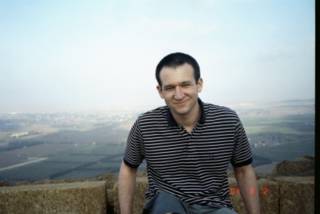Hi, here is a piece on peace studies I posted to MidEastWebDialog, which I encourage all those with an interest in the Israeli-Palestinian conflict to join. Comments welcome.
Here is my view on Peace Studies (here at Fordham it is called "Peace
and Justice Studies").
When I was at Vassar, I had occasion to attend a local Chabad sales
pitch session, one of those get togethers where Chabad serves some
food, shows a movie, and talks about Chassidus. So the guy there
started to talk about what Chassidus was, and basically defined it as
(I am paraphrasing) "those who are more pious". So I asked the guy if
that maybe was a little bit immodest. Isn't this saying, "I'm a
better Jew than you"?
I feel similar about purveyors of Peace Studies. Inherent the idea of
peace studies is a self-righteous notion that says "I'm for peace, and
therefore I'm better than you. We're the angels, you're the
Hobbesians making this world horrible." There's a touch of
mind-numbing political correctness to the whole idea.
This is not a knock against peace studies professors per se any more
than my anecdote is a knock against followers of Lubavitch. It is
clear that they are capable of decent analysis; there is a guy at
OpenDemocracy.net called Paul Rogers who writes very good and
interesting columns on security policy who is a professor of peace
studies. But the visible Peace Studies people at Fordham are so
hopelessly leftist and anti-Israel that it's hard to see Peace Studies
as simply an ingathering of Marxist humanities scholars (and not
Rousseau followers who believe humanity is good). Even Rogers has his
books published by the Pluto Press. And intellectually, they push a
vision of peace that is just about indistinguishable from pacifism. I
don't honestly see them supporting any war.
This is not to let guys like Steinberg off the hook. There is no
question that hardcore Hobbesians have a political agenda (Pipes the
example par excellance) purportedly designed to minimize violence in
the long term. Realism can seem very much like a self-fulfilling
prophecy, and I think part of the idea of Peace Studies is to break
out of that thinking. But by definition, this requires the conscious
inclusion of advocacy in research.
It seems to me the difference is that Peace Studies people are
broadcasting the fact that they come to political analysis with an
extreme bias, an accepted-definition of peace without which nobody
else is allowed to join their club. It's not enough to simply do
research and state views. You have to take a loyalty oath of sorts.
I don't think that's a particularly good or fair idea, and it's
something of a reflection of the problems we often have talking to one
another across political lines.
Wednesday, June 16, 2004
A Blog of Michael Leon Brenner
Previous Posts
- On Sunday, I graduated from law school. Strange e...
- Hey folks, I am posting my review of Mel Gibson's...
- One more thing: I have another letter in Al-Ahram....
- The Jewish Press's Brenner/Plaut debate on the dea...
- I just discovered another letter in Al-Ahram weekl...
- Quickly, because I've got two finals next week. ...
- A new letter today in the Guardian. The Guardian,...
- So this whatever-it-is paper I'm working on is dri...
- The Guardian hasn't published one of my letters i...
- Still working on the Note. Today I attended a l...
Links
- Israeli newspapers in English
- Ha'aretz
- Jerusalem Post
- Ma'ariv
- Yediot Acharonot
- Jerusalem Report
- Globes Arena
- Conflict websites
- Mideastweblog
- Bitterlemons
- Ratna Pelle's Dutch Israeli-Palestinian Conflict
- Discussion groups
- Mideastweb's Dialogue
- Zionism-Israel on the Web
- Blogroll
- << List
- Legal Websites of Interests
- Israel Supreme Court (in English)
- United States Supreme Court
- The Jurist
- Bainbridge Blog (Corporations)
- Jewry in the former Soviet Union Federation of Jewish Communities of the CIS
- Other Jewish websites The Jewish List-A comprehensive
- Jewish News Sources
Jewish Bloggers
Join >>
Soviet Jewry News
baltimore jewish times
canadian jewish news
chicago jewish news
cleveland jewish news
commentary
Deep South Jewish News
detroit jewish news
jewish bulletin
jewish chronicle
jewish exponent
jewish family
jewish journal/north of boston
jewish heritage online
jewish post of ny
jewish press
jta
jewish week
jewish world review
lilith
l.a. jewish journal
moment
new vilna review
n.j. jewish news
san diego jewish journal
soviet jewry news
tikkun
usajewish
yudel line
zeek magazine


0 Comments:
Post a Comment
<< Home